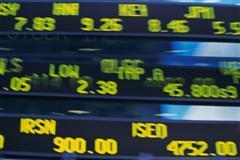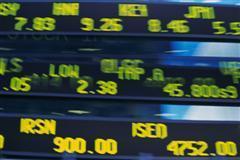| Home | About | Archives | RSS Feed |

@theMarket: Black Friday In More Ways Than One
 As 138 million Americans planned their Thanksgiving holiday assault on the nation's willing retail emporiums today, others around the world are working on a more lethal stratagem that has investors more concerned than thankful.
As 138 million Americans planned their Thanksgiving holiday assault on the nation's willing retail emporiums today, others around the world are working on a more lethal stratagem that has investors more concerned than thankful.
North Koreans greeted our Black Friday with their own version of a 21-gun salute as they bombarded the disputed waters around Yeonpyeong Island even as our U.S. commander in South Korea, Gen. Walter Sharp, was on the island inspecting this week's provocation by the North. The ongoing dispute follows the sinking of a South Korean submarine eight months ago in the same territory of the Yellow Sea. Asian markets sold off as tensions escalated.
There was not much Thanksgiving cheer in Southern Europe either as European debt worries escalated. You would think that now that Ireland has accepted a bail out from the EU, things would calm down. Instead, investors worried about which nation would be next on the list to cry for financial help. Portugal, it seems, is now the center of attention with Spain and Italy still waiting in the wings. Most European markets were trading down as U.S. markets opened on this holiday-shortened Friday.
I wouldn't make too much out of the sell-off. Readers may recall last year's sell-off on the same day as a result of a perceived financial crisis in the Middle East. The following week all the losses suffered that day were quickly regained and then some. As I cautioned readers last week, this pullback may have a bit more to go before the markets are ready to resume their climb.
On the plus side, our own economy appears to be gathering strength with unemployment dropping, consumer spending rising and consumer confidence regaining its footing. As the economic data continues to improve I expect it will provide firm support for further upside in the world’s stock markets. I guess the only possible fly in the ointment I see right now is the failure of congress to act on the looming expiration of the Bush tax cuts. As readers know, I have written about the predicted logjam in Washington that I fear is now upon us.
It is unbelievable to me that politicians will allow these cuts to expire at the end of the year. The Democrats argue that only the middle class should escape the tax increase while the Republicans want everyone including the "rich" (defined by those families who make more than $250,000 a year) to be spared the horrendous increase in taxes. In my opinion, if nothing is done and we all greet the New Year far poorer than we already are, the economy will most definitely suffer.
What rebound we are beginning to experience now will be short-circuited. Consumer confidence will falter and with it the stock market, housing and job growth. The actions of the lame-duck Congress since the elections have not given me a lot of confidence that the two sides will be willing to compromise on anything given the legislative stalemate that has occurred thus far. One can only hope that our elected officials will begin to act and do what is best for the country. As it stands, both sides seem to be preparing for re-election in two years as opposed to governing in the here and now.
At Thanksgiving dinner among friends and family in Pittsfield, both young and old were glum about the prospects for compromise within the government. We all agreed that this country needs term limits and needs them now as a possible start to electing leaders and not career politicians. However, that's not going to get the tax cuts expended by the Christmas holidays. I suggest we all write to Santa this weekend with those extensions at the top of our wish list. In the meantime, I hope you all had a great Thanksgiving.
Bill Schmick is an independent investor with Berkshire Money Management. (See "About" for more information.) None of the information presented in any of these articles is intended to be and should not be construed as an endorsement of BMM or a solicitation to become a client of BMM. The reader should not assume that any strategies, or specific investments discussed are employed, bought, sold or held by BMM. Direct your inquiries to Bill at 1-888-232-6072 (toll free) or e-mail him at wschmick@fairpoint.net. Visit www.afewdollarsmore.com for more of Bill's insights.
| Tags: Congress, overseas, economy |
@theMarket: The Dog That Wags the Tail
 It is becoming clearer by the day that the U.S. is no longer the Big Dog in financial markets. Ten years ago what happened overseas would have little if any impact on U.S. markets. Today most traders won't make a move without first checking overseas markets.
It is becoming clearer by the day that the U.S. is no longer the Big Dog in financial markets. Ten years ago what happened overseas would have little if any impact on U.S. markets. Today most traders won't make a move without first checking overseas markets.
Last week, I warned that we were in for at least a 5 percent correction and so far we've pulled back 4.4 percent on the S&P 500 Index. I expect continued choppiness through the holiday shortened week with a bias to the downside. There is a possibility that the markets could overshoot and register as much as 6-7 percent drop. I would buy that dip if it occurs.
This correction is a great example of how things have changed. It was countries such as China, Korea and Ireland, not America, which have dictated the turns in our markets.
Over the last two weeks (coinciding with the downturn in U.S. markets), the Chinese government had announced new efforts to slow its nation's growth. China fears that its economy is overheating. Inflation is already running at 10 percent and its citizens are actually hoarding all kinds of stuff from foods to gold to lumps of coal. The real estate market is also out of control and continues to rise each month despite the government's best efforts to slow its ascent. The government has threatened to raise interest rates, tighten monetary policy and take even more draconian methods such as selling commodities on the open market by the shiploads if necessary.
South Korea raised rates twice in two weeks for the same reason. Since April, (when we experienced a serious market pullback) a number of other foreign countries from Australia to Thailand have done the same thing in an effort to reign in their economies.
Markets here have declined in response to these moves because we have now become dependent on these countries for everything from supporting our deficit spending (by buying U.S. Treasury bonds) to the toilet seats in our bathrooms. Many Americans worry that we have traded our economic future for the short-term comforts of cheaper goods, living beyond our means and the "not in my back yard" attitude towards industrial expansion.
"The U.S. is rapidly becoming just another Third World power," laments a 90-year-old retired investor who I make a practice of calling every month or so.
No, he's not a client, but I find his perspective refreshing and his comments pregnant with wisdom and experience. Normally, you don't hear that kind of comment from someone whose family practically built Pittsfield; who was a hero of World War II, and who came home to become one of the county's pillars of industry.
He enumerated all the obvious failings: corrupt politicians, the disappearance of industry, the stratification of classes, our failure to compete educationally and the rampant greed among our captains of industry.
"Take a company I won't name that left this area, shipped off jobs and industry to places like Mexico just to get their share price up," he explained. "It practically wiped out this place, and for what? The price is lower now than when they left."
Hopefully, my friend is proven wrong and this turns out to be just a rough patch that we here in America are going through. I for one have been hoping that the financial crisis of the last two years would be a wake-up call for all of us from the White House on down. So far the jury is out, but Thanksgiving is coming and despite all of our issues, we here in this country have a lot to be thankful for.
 Speaking of which, if you know of any families around the county who might need a helping hand during this holiday season, we here at Berkshire Money Management, 392 Merrill Road, Pittsfield, will be giving away 150 turkeys and $20 gift certificates to Wohrle's Foods beginning Monday, Nov. 22, between noon and 4 (as long a supplies last). It's our way of giving back to a community that makes us feel welcome and wanted.
Speaking of which, if you know of any families around the county who might need a helping hand during this holiday season, we here at Berkshire Money Management, 392 Merrill Road, Pittsfield, will be giving away 150 turkeys and $20 gift certificates to Wohrle's Foods beginning Monday, Nov. 22, between noon and 4 (as long a supplies last). It's our way of giving back to a community that makes us feel welcome and wanted.
Bill Schmick is an independent investor with Berkshire Money Management. (See "About" for more information.) None of the information presented in any of these articles is intended to be and should not be construed as an endorsement of BMM or a solicitation to become a client of BMM. The reader should not assume that any strategies, or specific investments discussed are employed, bought, sold or held by BMM. Direct your inquiries to Bill at 1-888-232-6072 (toll free) or e-mail him at wschmick@fairpoint.net. Visit www.afewdollarsmore.com for more of Bill's insights.
| Tags: correction, inflation, China, overseas markets |
The Independent Investor: General Motors — Back to the Future
|
|
 It will be the largest public offering in U.S. history. A total of $23.1 billion was raised, including $4.35 billion in preferred stock. That was no small accomplishment, given the recent sell-off in world markets. General Motors is back.
It will be the largest public offering in U.S. history. A total of $23.1 billion was raised, including $4.35 billion in preferred stock. That was no small accomplishment, given the recent sell-off in world markets. General Motors is back.
What a difference two years make. Over that time, I had written several columns at first advocating letting GM go bankrupt (which it ultimately did). It was either that or a merger, if they could find an auto company that was willing to step up to the plate and buy it. There were no takers. When the government announced its last resort of a $49.5 billion bail out last year, I had mixed feelings.
After the huge bank bailouts, I wasn't happy about rescuing GM. I believed that the auto company deserved its fate. Its management had guided the company downhill ever since the mid-90s with the help of the labor unions. It was their arrogant "we know best" attitude in the face of obvious changes in the global automotive marketplace (such as the move toward smaller, more fuel-efficient cars) that really bothered me.
On the other hand, I also knew that we didn't need another avalanche of layoffs in the face of an unemployment rate that was climbing at 400,000 lost jobs per month. And GM employees were only the tip of the iceberg when it came to lost jobs. The ripple effect on auto suppliers would have to be added to the GM jobs. Then there were the dealerships across the nation. Car dealers provide enormous benefits to just about every local community in America in the form of jobs, taxes and charitable giving, while providing increased shopping traffic to the community they reside in.
By the time I took account of the enormous blowback GM and Chrysler's demise would cause, I reluctantly agreed that the bailout was better than the alternative although my stance was not very popular among readers.
In September 2009, in "Why Americans Should Become Detroit's Long-Term Investors," I wrote the following about the billions in taxpayer money we were investing:
 Now, as we like to say in the money-management business, the past is no guarantee of future performance, yet there is a chance if we have a little patience here we too could walk away with a big return. Besides, what do we the taxpayers have to lose? Sure, I know there will be some that say the government has no business becoming the major shareholder in American auto companies and should exit this investment at the earliest possible time. Some will even say it is un-American if we don't. I say it's a little too late for those attitudes. The horse is already out of the barn. So go ahead and call me a socialist. I say we took a huge risk when no one else would, and we deserve a commensurate return on this investment. Now, as we like to say in the money-management business, the past is no guarantee of future performance, yet there is a chance if we have a little patience here we too could walk away with a big return. Besides, what do we the taxpayers have to lose? Sure, I know there will be some that say the government has no business becoming the major shareholder in American auto companies and should exit this investment at the earliest possible time. Some will even say it is un-American if we don't. I say it's a little too late for those attitudes. The horse is already out of the barn. So go ahead and call me a socialist. I say we took a huge risk when no one else would, and we deserve a commensurate return on this investment.Now that presumes I have some faith in the future of the American auto industry, and I do. All I have read concerning the on-going restructuring taking place in research and development, in manufacturing processes, and management structures indicate to me that the Big Three are getting their act together. Ford is clearly on the right path and so are GM and Chrysler. After all, none of them have lost their main competitive edge—American labor and ingenuity. I'll bet on that. So let's hang in there. I believe a little patience will pay off for all of us down the road.  |
So far GM has returned $9.5 billion of that loan. With this offering, another $13 billion will flow back to the government, leaving taxpayer ownership at roughly 26 percent, down from 61 percent. It is a shame that the government does not have the patience to hold on to its shares because, over time, I think taxpayers could have made a substantial profit.
I guess removing the "government motors" stigma from the company outweighed the profit motive. Over the next few years, the government will continue to sell down its position in the same manner that they are now reducing their ownership of Citibank (at a profit). It looks like most of our investment will be recouped and at a far faster than I imagined.
Bill Schmick is an independent investor with Berkshire Money Management. (See "About" for more information.) None of the information presented in any of these articles is intended to be and should not be construed as an endorsement of BMM or a solicitation to become a client of BMM. The reader should not assume that any strategies, or specific investments discussed are employed, bought, sold or held by BMM. Direct your inquiries to Bill at 1-888-232-6072 (toll free) or e-mail him at wschmick@fairpoint.net. Visit www.afewdollarsmore.com for more of Bill's insights.
| Tags: GM, bailout |
@theMarket: Corrections Are Good for the Soul
 It was long overdue. For weeks, the stock market has registered overbought conditions and still it forged ahead. Investors had driven the averages back to yearly highs and only then did the rally run out of steam. Now it's time to step aside and watch.
It was long overdue. For weeks, the stock market has registered overbought conditions and still it forged ahead. Investors had driven the averages back to yearly highs and only then did the rally run out of steam. Now it's time to step aside and watch.
"Is this the start of something big or should I just stay put?" asked a retired client from Pittsfield who has recouped much of his 2008 loses over the last year.
"Stay put," I said, "because this pullback will be short and unless you are a day trader, too volatile to do more than add to existing positions."
I'm thinking we could see the stock markets drop as much as 5 percent, which from here isn't such a big deal. Take the S&P 500 Index, for example. This week it hit an intraday high of 1,227 (almost 10 points higher than its peak in April). A 5 percent decline from that level would put the average at 1,165, a mere 30 points down from here. That's not worth getting excited about.
As a rule of thumb, I believe that 5 percent to 10 percent corrections in the stock market are the "price of doing business" or the risk one must accept in equity investing. These kinds of corrections occur 2-3 times a year on average. And it is not just equities that are falling.
Commodities are also declining. As I look at the present spot price of gold, the precious metal is off over $40 an ounce while silver is down $1.50 an ounce and oil has plummeted over $3 a barrel — in just one day. Commodities tend to have extremely sharp, if short, corrections that tend to wilt most amateur investors' resolve to stay invested. It appears that once again those who have chased energy, precious metals and agricultural commodities are suffering big reversals this week. Rather than buy this weakness, they tend to sell in panic.
For those with bullish convictions, this pullback is a buying opportunity, not only in commodities but stocks in general. This coming week should provide further opportunities to establish new positions. Some of the areas I favor for additional investment are emerging markets, real estate such as REITs, commodities, commodity companies and selected technology.
As for the culprits that triggered the pullback, most of the negative events have something to do with governments. The on-again-off-again saga of the European debt crisis has reignited fresh worries over Ireland's struggle to rescue its financial system. It has led investors to re-examine Europe's financial situation in general.
At the same time, China is rumored to be hiking interest rates in an attempt to slow their economy. That would spell bad news for everyone since China has become the new locomotive of global growth. Over in Korea, where the G20 adjourned without agreeing on how to curb the growing currency war, left investors worried and disappointed over the fate of the U.S. dollar.
All of the above are serious issues but they have been with us throughout the year. China has raised rates before and emerging market growth is still quite healthy. The problems of Europe's smaller economies will continue to plague the Euro and the European Community for the next few years, but has not stopped their stock markets from enjoying substantial gains over the last six months.
The financial world is fully aware of every nuance of the currency debate. The dollar has declined since late August, sending stocks and commodities ever upward. None of this is new. Consider this pullback a healthy correction and that's all you need to know.
All these reasons for the sell-off will still be with us a month from now when the averages have regained their upward ascent, so don't put too much stock in today's headlines. They are fleeting at best. Focus instead on the opportunities this sell-off will present.
Bill Schmick is an independent investor with Berkshire Money Management. (See "About" for more information.) None of the information presented in any of these articles is intended to be and should not be construed as an endorsement of BMM or a solicitation to become a client of BMM. The reader should not assume that any strategies, or specific investments discussed are employed, bought, sold or held by BMM. Direct your inquiries to Bill at 1-888-232-6072 (toll free) or e-mail him at wschmick@fairpoint.net. Visit www.afewdollarsmore.com for more of Bill's insights.
| Tags: corrections, stocks, metals, China, commodities |
Veteran Takes Deserved Day Off
 |
Yes, that really is our finanical columnist Bill Schmick in Vietnam 42 years ago. Bill, who served four years as a Marine, took Veterans Day off. Thanks, Bill, to you and all veterans.
| Tags: veterans |

